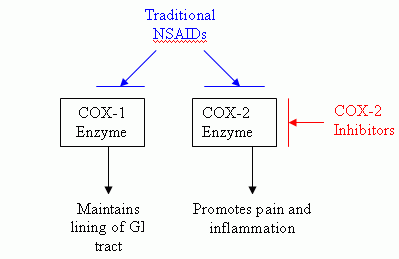There are two main types of oral medications which have been shown to relieve pain and the other symptoms of osteoarthritis of the knee: acetaminophen (Tylenol) and non steroidal anti-inflammatory drugs (NSAIDs)
Narcotic drugs (eg. codeine, morphine, percocet) are rarely used when pain is not controlled by the above mentioned medications alone. However, they do carry unfortunate side effects of nausea, vomiting, dizziness, and constipation and are therefore prescribed for short term use only. Prolonged used of these drugs for pain management of osteoarthritis is not recommended. Often they are used as a last resort while patients await surgery. Consultation with a physician is important before starting any regular oral medications.
Acetaminophen (Tylenol©)
Acetaminophen is a common household pain reliever. It can provide very effective relief of osteoarthritic symptoms when taken regularly either alone, or in combination with anti-inflammatory medications. This drug is relatively inexpensive and available without a prescription. Acetaminophen does not have many serious side effects. It is therefore safe for use by much of the general population. Acetaminophen should not be used by individuals who suffer from known liver disease or by patients who abuse alcohol. It should also be used cautiously be people with known kidney disease. Such patients should consult their doctor and their pharmacist before starting regular acetaminophen therapy.
Non Steroidal Anti-inflammatory Drugs (NSAIDs)
NSAIDs (pronounced “ensayds”) are a large group of medications that are available either over the counter or by prescription. NSAIDs provide relief from both the pain and the inflammation associated with osteoarthritis or soft tissue injuries. The greatest limitation of their widespread use has been related to the risk of gastrointestinal bleeding. People that use NSAIDs for a long period of time, elderly individuals and people who have had a history of stomach or intestinal ulcers are at greatest risk of gastrointestinal bleeding. People with active stomach or intestinal ulcers should not take NSAIDs.
Cyclo-oxygenase (COX) is an enzyme that has many functions including the conversion of arachadonic acid into prostaglandins. The NSAIDs which have been around for many years (traditional NSAIDs) such as ibuprofen (Motrin) and naproxen work by blocking both the COX-1 enzyme and the COX-2 enzyme pathways (see figure below). Among other functions, COX-1 is involved in protecting and maintaining the lining of the stomach and intestines and COX-2 is involved in the inflammatory pathway (see diagram on the last page). Because traditional NSAIDs block the functions of both of these pathways, people are at risk for breaking down the lining of their stomach or intestines leading to bleeding and ulcers. In recent years, a new class of NSAIDs known as the COX-2 inhibitors has been developed. This class of drugs has the anti-inflammatory and anti-pain effects of the older NSAIDs but they have a reduced risk of stomach and intestinal bleeding as they do not specifically target COX-1. The other added benefit of these newer drugs is that they only need to be taken once or twice daily. Some of the older, traditional NSAIDs need to be taken three to four times daily to be effective. The disadvantage of this newer class of NSAIDs is that they can cost considerably more than ibuprofen.

The following is a list of some commonly prescribed NSAIDs:
| Generic Name | Brand Name |
| Traditional NSAIDS Acetylsalicylic Acid (ASA) Diclofenac Ibuprofen Naproxen | Aspirin* Voltaren Advil, Motrin* Naprosyn, Anaprox |
| COX-2 Inhibitors Celecoxib Rofecoxib | Celebrex Vioxx |
*Available over the counter
Most people can use NSAIDs safely and effectively. Common side effects of NSAIDs include stomach discomfort, diarrhea, and nausea. NSAID use should be stopped if there are signs of gastrointestinal bleeding including bloody stools, black tarry stools, or persistent vomiting with evidence of blood. NSAIDs should also be used with caution in people who have asthma, high blood pressure or known kidney disorders. People who have allergies to aspirin (A.S.A.) or similar medications cannot take NSAIDs. A doctor should be consulted prior to starting any regular NSAID therapy.
To read more about osteoarthritis of the knee please visit the links section. Links have been provided to other websites as well as online medical journals. Knee injury topics can also be accessed.
